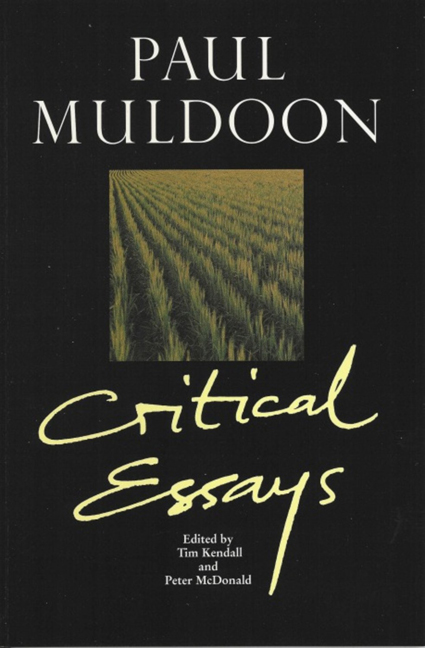Book contents
- Frontmatter
- Contents
- Acknowledgements
- Notes on Contributors
- Introduction
- ‘Thirteen or Fourteen’: Paul Muldoon's Poetics of Adolescence
- Never Quite Showing his Hand: Robert Frost and Paul Muldoon
- For Father Read Mother: Muldoon's Antecedents
- Pax Hibernica/Pax Americana: Rhyme and Reconciliation in Muldoon
- Muldoon and Pragmatism
- ‘All That’: Muldoon and the Vanity of Interpretation
- Paul Muldoon's Transits: Muddling Through after Madoc
- ‘All Art is a Collaboration’: Paul Muldoon as Librettist
- Muldoon's Remains
- Index
For Father Read Mother: Muldoon's Antecedents
- Frontmatter
- Contents
- Acknowledgements
- Notes on Contributors
- Introduction
- ‘Thirteen or Fourteen’: Paul Muldoon's Poetics of Adolescence
- Never Quite Showing his Hand: Robert Frost and Paul Muldoon
- For Father Read Mother: Muldoon's Antecedents
- Pax Hibernica/Pax Americana: Rhyme and Reconciliation in Muldoon
- Muldoon and Pragmatism
- ‘All That’: Muldoon and the Vanity of Interpretation
- Paul Muldoon's Transits: Muddling Through after Madoc
- ‘All Art is a Collaboration’: Paul Muldoon as Librettist
- Muldoon's Remains
- Index
Summary
‘Should they not have the best of both worlds?’
‘A historical dictionary should always be within a poet's reach: preferably the big Oxford English Dictionary – the two-volume edition is insufficient’; ‘a single “trip” under psilocybin, the toxic derivation of a Mexican mushroom, can […] be most informative. It […] reveals in pictorial imagery the hidden terrors and aspirations of the […] mind’; ‘it is all done with mirrors […]. The intricate pattern [is made by] interlinked images of several round mirrors set at different angles to one another […]. This is a close enough metaphor for Poetry’; ‘True poetic practice implies a mind so miraculously attuned and illuminated that it can form words, by a chain of more-than-coincidences, into a living entity.’ Such comments are irresistibly evocative of Muldoon's own poetic practice, with its lexicographical obsessions, dabbling in symbolic and actual (sometimes magic) mushrooms, fascination with circular patterning – to the extent that it seems as if Muldoon is trying to draw his entire oeuvre, though concentric circles, into one Great Wheel – and habitual modus operandi in which he leaps, seemingly arbitrarily, from ‘something else’ to ‘something else again’. But they belong, of course, not to the current Oxford Professor of Poetry, rather to one of his predecessors in that role in the early 1960s, Robert Graves.
Graves, whose poetry has always appeared reassuringly straightforward, might seem an unlikely precursor for the mythological and lexicographical challenge posed by Muldoon's work. But the unlikely precursor, the one who generally goes unmentioned by Muldoon, may – in this instance as in others – prove more likely in the end, on the basis not so much of what Muldoon professes in interviews, but of what he practises in poetry. In ‘Errata’, the poet suggests one way to ‘read’ the Muldoon oeuvre:
For ‘Antrim’ read ‘Armagh’.
For ‘mother’ read ‘other’.
For ‘harm’ read ‘farm’.
For ‘feather’ read ‘father’. (P, 445)
- Type
- Chapter
- Information
- Paul MuldoonCritical Essays, pp. 45 - 61Publisher: Liverpool University PressPrint publication year: 2004



